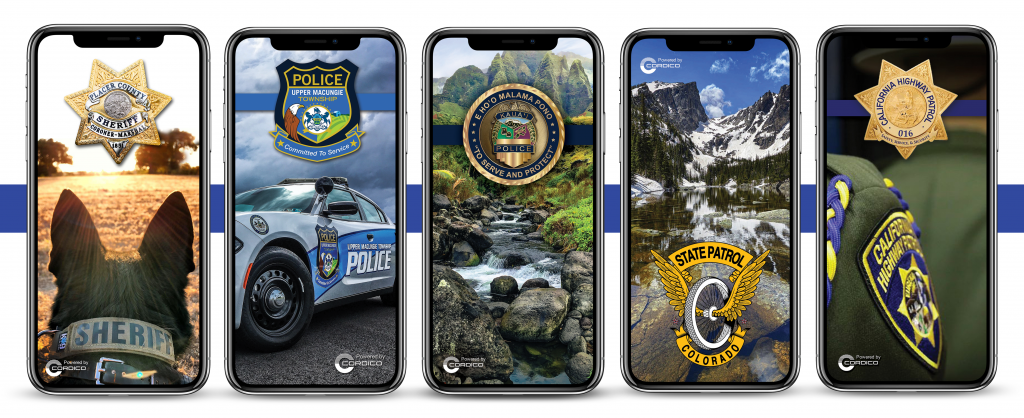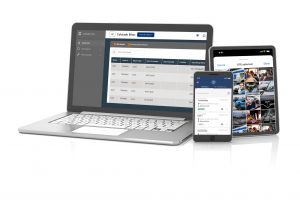In 2017, Chief John Carli of the Vacaville, California, Police Department went in search of creating a customized mobile wellness app for his agency.
One year earlier, in 2016, Chief Dave Hofmann of the Lawrence, Indiana, Police Department was looking for a solution to alleviate the responsibility of officers needing to remember to activate their body-worn cameras while responding to critical incidents.
Although seeking different products, both of these chiefs were on the hunt for an innovative use of the technology that has swiftly become a standard in the law enforcement field—cloud-based services.
CrimeCenter Operations Manager Michael Cunningham described cloud-based systems as “any that use the Internet to store, manage, and process data off-site rather than on a local server.”1 The “cloud” has been at the forefront of modern policing for many years due to a surge in the volume of data from cellphones, surveillance systems, dash and body-worn cameras, and personal computers.
Because the cloud has become such a common tool in law enforcement, companies have delved deeper into what the technology can offer to the field, expanding their line of products from storage uses to “smart” technologies and mobile applications.
MOBILE APPLICATIONS
Created to provide high-quality, customized, and science-based officer wellness toolkits and cloud-based software, Cordico, Inc., gives law enforcement on-demand access to expert-designed wellness modules, peer support, and vetted therapists.
Headquartered in Gold River, California, Cordico provides custom-designed native iPhone and Android apps for agencies of all types and sizes. The apps are designed to collect no personal information and to ensure confidentiality and anonymity. “Our police psychologists continually design new officer wellness tools based upon years of firsthand clinical work with police, and our app engineering team utilizes encrypted cloud-based technology to place these life-saving tools directly into the hands of law enforcement and their families,” said Dr. David Black, CEO, founder, and chief psychologist of Cordico.2 He says that one of the best things about cloud-based technology is that it enables immediate deployment of tools and resources.
The first Cordico wellness app launched in early 2018 under the leadership of Chief Carli at the Vacaville Police Department. “My vision was to put the very best officer wellness tools and resources into the hands of officers nationwide and beyond,” said Chief Carli. “I understood from the start that this would require strong teamwork and effort to achieve that vision.” This teamwork mentality was showcased in the creation of the wellness app by the Cordico team.
The service Cordico provides spans three domains: app engineering, app implementation, and client care. The app engineering team builds and customizes every app. In addition to deploying best practices to maximize installation and utilization of the app, the app implementation team designs customized presentations, posters, and promotional materials. Cordico’s client care team provides continual support for each client, constantly updating the apps with new officer wellness tools, features, and benefits to ensure all needs are met.

BODY-WORN CAMERAS
One of the most well-known uses of cloud technology is the uploading and storage of body-worn camera footage. However, Decatur, Georgia-based BodyWorn by Utility has reached beyond that capability to develop smart technology that can automatically turn on body-worn cameras for officers in the field.
The development stemmed from the idea that officers were asked to take on an additional responsibility of turning on their body-worn camera during potentially dangerous and stressful encounters. The team at BodyWorn believed that technology could perform that task for the officers.
BodyWorn’s advanced capabilities and features allow for policy-based automatic recording, in which the officer does not have to manually start a video recording. The software-driven recording systems can be configured to automatically start or stop recording based on an agency’s specific policies, helping to promote efficiency, transparency, and accountability.
Automatic recording triggers include computer-aided dispatch (CAD), officer down alert, foot pursuit, and struggle activation—as well as smart holster sensor alert, vehicle sensor activation, and action zones and geofences.
Lawrence Police Chief Dave Hofmann implemented BodyWorn’s camera system to be ahead of the technological curve. “What we wanted to do was alleviate the responsibility of the officers to have to think about activating their camera,” Chief Hofmann stated. “We just wanted to make it… easy for the officers to think about their job and not think about the technology.”3
Through over-the-air software updates to cameras in the field, BodyWorn provides current compliance with an agency’s ever-changing recording policies.
DATA MANAGEMENT
The use of cloud technology for data management is perhaps the most common application. However, that does not mean the area is not evolving.
LexisNexis Coplogic Solutions, an Alpharetta, Georgia-based company, recently unveiled a dynamic and highly configurable cloud-based data management and optimization platform—Coplogic Ethos. Along with being scalable and configurable, the technology is compatible with Amazon Web Services and Microsoft Azure. “Coplogic Ethos propels agencies into the native mobile era, giving them more control and flexibility over forms and optimizing workflows,” said Roy Marler, vice president of LexisNexis Coplogic Solutions.4
Two key solutions run on the Ethos platform: LexisNexis eCrash and LexisNexis eCitation. The flexible and convenient Ethos fast tracks and simplifies field-based crash and citation reporting across the traffic unit, including motorcycle, bike, and patrol units.
Ethos allows for improved officer safety and productivity and greater control of data management, and it acts as a force multiplier, enabling proactive patrolling with simplified workflows.
Native mobile apps like Coplogic Ethos can be used on any device or operating system without requiring an Internet connection, which enables fast performance and a high degree of reliability.
Also advancing the data management realm of cloud-based services is CrimeCenter. Based out of Newark, New Jersey, CrimeCenter provides a comprehensive cloud-based records, investigation, intelligence, and integrity management platform to law enforcement.
The platform has five modules, and each contains a group of related functional tools that can stand alone to meet a specific need or can be combined to form an integrated platform sharing a common user interface and allowing an easy exchange of data. While most record management systems begin with a call and end with the incident, CrimeCenter also powers the work that takes place following the incident.

Within the incident module, the incident is transformed into a purposefully designed electronic case folder, providing the team with a digital workspace to organize, compile, collaborate, and efficiently resolve the matter. The interactions module encourages transparency and two-way communication with the public through the Citizen Interaction Portal. The investigation module ties together all aspects of an investigation and breaks down complex cases into manageable pieces. It is followed by the intelligence module where confidential informants can be registered, managed, and protected and intelligence can be reviewed and processed. With the integrity module, users conduct personnel management tasks to track human resources, caseloads, activity, training, and performance.
With a goal to democratize incident and investigation management, CrimeCenter has produced a solution that securely stores data in the Azure Government Cloud with cutting-edge security firewalls and redundancies compliant with CJIS requirements.5
Whether the goal is to provide wellness tools to officers or to revamp data management processes, companies are constantly looking for innovative ways to enhance the law enforcement field through cloud-based services, easing the officers’ workload and encouraging the focus to be placed on other responsibilities. d
Notes:
1 Michael Cunningham, “4 Benefits of Cloud-Based Solutions for Law Enforcement,” CrimeCenter Software, November 28, 2017.
2 David Black, PhD (CEO, founder, and chief psychologist, Cordico, Inc.) email interview, June 29, 2020.
3 Kristen Jaynes (digital brand specialist, Utility, Inc.) email interview, July 2, 2020.
4 Ray Marler (vice president, LexisNexis Coplogic Solutions) email interview, July 9, 2020.
5 Laura Budraitis (director of client relations, CrimeCenter) email interview, June 29, 2020.
|
SOURCE LIST
|
||
|
|
|
VIQ Solutions | Net Transcripts
|


